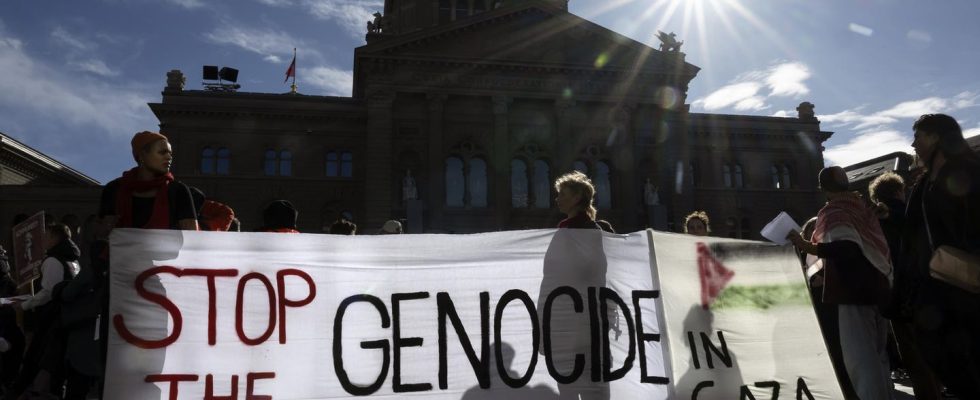War in the Middle East
Accusation against Israel: At what point do we start talking about genocide?
“Stop the genocide in Gaza” is written on a banner at a show of solidarity for Palestine in Bern
© Anthony Anex / KEYSTONE / DPA
Since Hamas attacked Israel, the country has defended itself with massive bombings and increasingly with ground troops. Civilians die every day in the Gaza Strip. Many people therefore accuse Israel of genocide. But what’s the point?
With every rocket that hits the Gaza Strip, the tone changes Israel rougher. Since the conflict between the militant Hamas and Israel escalated into a bloody war, people around the world have expressed solidarity with the civilians in the Gaza Strip and condemned Israel, which defended itself against the terrorist militia after the Hamas attack on October 7th. Criticism of Israel recently culminated in a remarkable statement by climate activist Greta Thunberg. She accused the country of committing genocide in the Gaza Strip.
Thunberg is not alone with this opinion. In New York and Washington, people protested against the “genocide” in Gaza – including rabbis from the group Jewish Voice for Peace, who spoke in New York of a genocide “in our name.” Politicians such as Turkish President Recep Tayyip Erdogan made similar statements.
The previous head of the UN High Commissioner for Human Rights, Craig Mokhiber, also found clear words. He recently resigned from his position while criticizing the United Nations. “Once again we see genocide unfolding before our eyes, and the organization we serve appears powerless to stop it,” he wrote to colleagues in Geneva, according to a report in The Guardian. The mass killing of Palestinians in the Gaza Strip is based “on an ethno-nationalist colonial settler ideology (…) of decades of systematic persecution and cleansing.” His conclusion: “This is a classic case of genocide.”
But the situation is far from that clear.
What is genocide?
The term genocide is equated with genocide and goes back to the Holocaust perpetrated by the Nazis. It was introduced by the Jewish lawyer Raphael Lemkin to describe the murder of Jews. Lemkin also advocated for the genocide to be punished under international law. The term was incorporated into the Geneva Convention in 1948.
Lawyers speak of genocide or genocide when the following acts are committed for racial, ethnic or religious reasons:
- killing
- serious physical or psychological harm to members of a group
- Imposition of living conditions that can completely destroy members or entire groups
- Measures that prevent births within a group
- forcible transfer of children to another group
There are several examples of genocide: including the crimes committed by the German colonial power against the Herero and Nama people in 1904 and 1908. The UN war crimes tribunal for Rwanda described the killing of hundreds of thousands of Tutsi in Rwanda (1994) as genocide. The starvation deaths of millions of Ukrainians and farmers of other nationalities by the Soviet Union in the 1930s (Holodomor) were described as genocide by a Ukrainian court. Kiev and Moscow are currently accusing each other of genocide again in connection with the Russian invasion. The International Court of Justice and the UN War Crimes Tribunal for Yugoslavia have also described the mass murder of the Serbs against the Bosniaks as genocide. And the German Bundestag speaks of a genocide in view of the killing of countless Yazidis (2014-2017) by the Islamic State.
There can only be one motif
According to international law, the intention behind all these measures must be to destroy a group. “However, the goal does not have to be achieved in order to fulfill the offense and be punished for genocide,” says Lisa Wiese from the Institute for International Law at the University of Leipzig star. The decisive factor is the intention to destroy, which “is usually very difficult to prove”. The number of victims is rather insignificant, but could indicate corresponding intentions.
According to a ruling by the International Court of Justice in the case of Croatia versus Serbia in 2005, the intent to destroy must be the only motive. As soon as other reasons become apparent, the crime of genocide can be rejected. “The destruction of the group must be the perpetrator’s only goal,” emphasizes Wiese.
No evidence of genocide in Gaza
According to lawyers, the case in the war between Israel and Hamas is difficult to assess based on the current state of information. “Even if individual actions by the Israeli armed forces can be described as war crimes, they do not at the same time constitute genocide,” Matthias Hartwig from the Max Planck Institute for Comparative Public Law and International Law told the star. So far, Israel has not expressed any intention of wiping out the population in the coastal strip. The military analyst at the Institute for National Security Strategy (INSS) in Tel Aviv, Kobi Michael, simply said in the ZDF interview that Israel must “eliminate Hamas as a military organization.”
Legal scholar Lisa Wiese from the University of Leipzig also admits that Israel has a right to self-defense under international law. This includes the use of military force – within the framework of international humanitarian law. In another case, the International Court of Justice also found that threats of violence or acts of violence against another state alone are not sufficient to speak of genocide. Overall, lawyers agree that there is currently no evidence of genocide in Gaza. According to Hartwig, it is still too early for a final assessment. Depending on how the conflict develops, evidence of genocide may also increase.
Sources: Federal Agency for Civic Education, House of the Wannsee Conference, Genocide Convention“The Guardian“, ZDFwith material from DPA and AFP.


